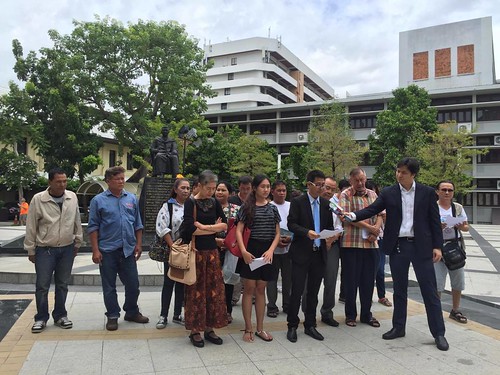Academics and human rights advocates have demanded the authorities to amend a controversial act barring people to freely criticise the junta-sponsored draft constitution, saying that opinions from all sides are crucial for the draft charter referendum.
Academics from Institute of Human Rights and Peace Studies (IHRP) of Mahidol University, and human rights advocates from iLaw and Union of Civil Liberties (UCL) gathered at Pridi Phanomyong Square in Thammasat University, Tha Prachan Campus, Bangkok, to read a joint statement titled ‘Referendum, Freedom and Liberties’.
The group urged the authorities to review the Draft Referendum Act, saying the upcoming referendum on the draft constitution will not be legitimate if certain articles in the Draft Referendum Act are not amended as such articles suppress voices of the draft critics.
“The organisers of the [draft constitution] referendum must leave it to the people to decide. Therefore, people who approve or disapprove of the referendum shall have equal freedom in expressing their opinions,” reads part of the group statement.
They pointed out that the wordings of Article 61 is written ambiguously resulting in repression of the critics of the draft constitution and the draft referendum process.
Sriprapha Petcharamesree, IHRP academic, said at the event that without given the rights to people from all political spectrums to voice their opinions about the draft charter referendum, the referendum will not be legitimate and will not lead to democracy.
Chanoknan Ruamsap, a youth anti-junta activist representing the New Democracy Movement (NDM), told media that since the future constitution will be the highest law of the country. Therefore, people should be allowed to express various opinions on it.
The controversial Article 61 of the Referendum Act imposes a prison term of up to 10 years, a fine of up to 200,000 baht and loss of electoral rights for five years on anyone who publishes or distributes content about the draft constitution which deviates from the facts, contains rude and violent language, or threateningly discourages voters from participating in the referendum.
Recently, Thailand’s Ombudsman Office submitted a request to the Constitutional Court to rule whether Article 61 of the Referendum Act is unconstitutional or not as many political dissidents criticise that it allows the authorities to suppress critics of the junta-sponsored draft constitution because it is written ambiguously.
The Constitutional Court has accepted the request.

Human rights advocates and pro-democracy academics gather at Thammasat University, Bangkok, to read a joint statement titled ‘Referendum, Freedom and Liberties’ on 21 June 2016
Prachatai English is an independent, non-profit news outlet committed to covering underreported issues in Thailand, especially about democratization and human rights, despite pressure from the authorities. Your support will ensure that we stay a professional media source and be able to meet the challenges and deliver in-depth reporting.
• Simple steps to support Prachatai English
1. Bank transfer to account “โครงการหนังสือพิมพ์อินเทอร์เน็ต ประชาไท” or “Prachatai Online Newspaper” 091-0-21689-4, Krungthai Bank
2. Or, Transfer money via Paypal, to e-mail address: [email protected], please leave a comment on the transaction as “For Prachatai English”
